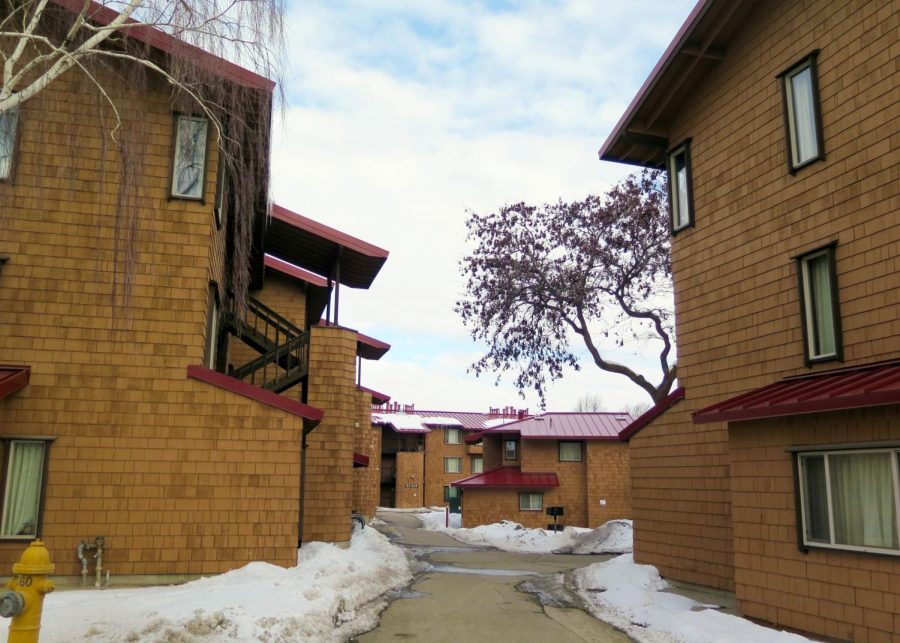Editorial: A transition in living arrangements
Student village, sometimes nicknamed “studville”, is one option of the on campus apartments CWU offers. “Studville” is home to studio, one, two and three bedroom apartments.
March 8, 2019
Scrambling to figure out where you will live in the next academic year is a time honored college tradition that usually picks up steam around the beginning of March. With housing both on-and off-campus to choose from, the factors involved in the decision can feel innumerable. Having moved from on-campus dorms to a university-owned apartment and then finally fully off-campus, I’ve been lucky enough to glean some insight into the pros and cons of each living situation.
On-Campus Dorms
The beginning of many students’ college experience is set in a room with two beds, two wardrobes, two desks and one stranger to share their life with for the entirety of their first year. This setup, with all the scheduled programming and socialization opportunities that it offers, is a near ideal place to get to know the campus and your peers. A meal plan typically follows this kind of housing arrangement, which means students can focus on their studies without worrying where their next meal might come from. The downsides to this is that there is a general lack of private space , limited agency over your living situation as a whole and the price of room and board. Annually, for a student with a medium-sized meal plan living in one of the Bassetis or Alford-Montgomery Hall, this will cost around $11,115 in addition to tuition. Whether or not that financial commitment is worth it depends on where your priorities lie. Living on-campus does come with the benefits of being close to classes and resources, as well as a good chunk of your social life.
On-Campus/University-Owned Apartments
Apartments such as Getz/Short, Brooklane Village and Wahle offer a sort of middle ground between dormitories and off-campus housing. These apartments are owned and operated by the university, which means it’s easy to funnel financial aid money into rent payments. The school bundles all amenities such as electricity, wi-fi, cable, water and waste removal into those rent payments, making this an easy option for those looking for more independence than the dorms can offer. Meal plans aren’t typically included in the pricing of these apartments, so students can expect to go grocery shopping and cook for themselves. For reference, a two-bedroom apartment in Getz/Short will run you about $515 per person, per month. These apartments typically include a living room, a kitchen, a shared bathroom and a bedroom for each occupant. It’s important to note that these apartments may not be furnished, so if you’re considering moving into one, check to see what you’ll need to bring beforehand (beds, couches, shelves etc.).
Off-Campus Housing
There is a large variety of off-campus housing available in and around Ellensburg. Pricing as well as size and available amenities fluctuates, so it’d be smart to do a good amount of research before jumping into an off-campus housing situation. That said, if you manage to get it right, living off-campus with others or by yourself can be your first real taste of what’s to come post-graduation. Paying rent and bills, commuting and learning to live constructively with others who may not share your standards of organization and sanitation can seem daunting at first, but it’s an important experience to have, and seeing your first real, proper grown-up home fully furnished for the first time is a deeply rewarding experience. Moving off-campus before your studies are over can make the transition from student to working adult smoother and less scary.
The Transition
Personally, I moved from Barto Hall to Moore Hall, then on to the Getz/Short apartments and finally off-campus. This resulted in a sort of gradual, incremental shift in personal and public responsibility that helped me transition from a high-schooler to a graduating senior in college, and hopefully, a functioning adult. College is just as much about your experiences as it is about your classes, and your living situation is a huge factor in that. Rather than choosing a home based on what you think is right for you currently, I recommend choosing one that will allow you to have the experiences you want to have.



